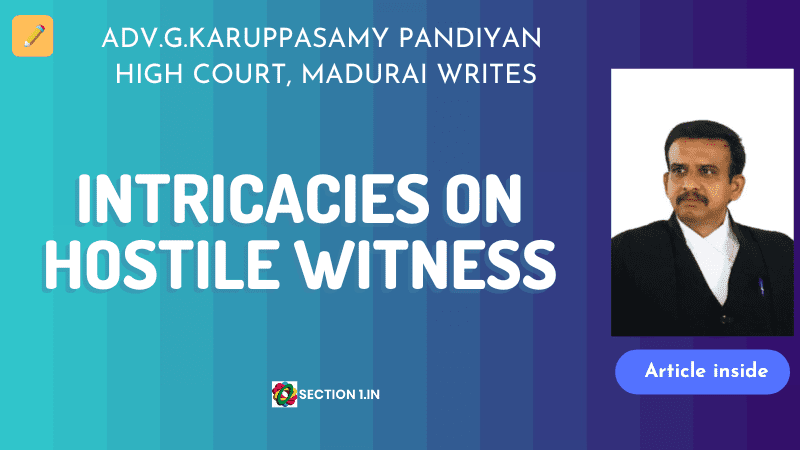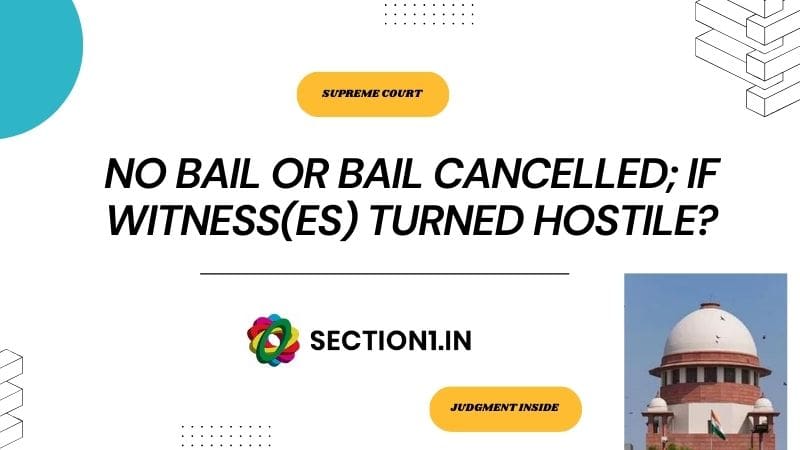Prelude:
“Witnesses” as Benthem said: are the eyes and ears of justice. If the witness himself is incapacitated from acting as eyes and ears of justice, the trial gets putrefied and paralysed, and it no longer can constitute a fair trial.
The most popular term “hostile witness” which is being spoken, used and known in the arena of criminal jurisprudence. The harsh reality is the term of hostile witness is not traced out in criminal law. However, section 154 of Indian Evidence Act talks about the witness who could be questioned by the party calling him. The two limbs of section 154 make it clear that the way in which the hostile witness and his evidence to be dealt with. For the sake of convenience and to know full well, the section 154 of Indian Evidence Act is extracted and reproduced herein:
154. Question by party to his own witness.
(1). The Court may, in its discretion, permit the person who calls a witness to put any question to him which might be put in cross-examination by the adverse party.
(2) Nothing in this section shall disentitle the person so permitted under sub-section (1), to rely on any part of the evidence of such witness.
The Legal Analysis on the evidence of Hostile Witness
The role of public prosecutor:
The role of public prosecutor while dealing with the hostile witness is so onerous and a public duty, according to section 154 ibid. The Hon’ble Madras High Court has held that public prosecutors think that it is a taboo for them to interview witnesses this outlandish attitude ought to be effaced. An interview by the prosecutor is an opportunity to instil confidence in the mind of the witnesses to speak the truth fearlessly (Bala Vs State 2014 (1) MLJ Crl 385).
Section 154 of Indian Evidence Act, though empowers the court to exercise its discretion to permit the party (prosecutor) to put any question to the witness who is called by the party. The term “any question” assumes signal importance and that question which might be put in cross-examination by the adverse party. Whereas, the permission to put question is an imperative. The court may even refuse to permit the party to question his own witness.
The Hon’ble Madras High Court has held in ringing terms that the public prosecutor while dealing with the hostile witness, he has to necessarily put any questions which might be put in the cross examinations (Ref: sections 141 and 145 of Indian Evidence Act). Further the court held that mere repeating 161 (3) statements in verbatim under the guise of cross examination with the casual suggestion that as if the witness deposes falsely owing to fear of the accused. This type of practice was deprecated by the Hon’ble Madras High Court in the Judgment namely Kannan @ Mannannai Kannan Vs. State reported in 2022 (1) MWN (Cri) 327.
Role of Courts whilst appreciating the evidence of hostile witness:
The judgment of Hon’ble Supreme Court in Vadivelu Thevar Vs. State of Madras reported in AIR 1957 SC 614, is considered to be the locus classicus which must be borne in mind while appreciating the evidence of witnesses. According to which Firstly, if the evidence of a witness is wholly reliable, there is no difficulty to relay on it. Secondly, If the evidence of a witness is wholly unreliable, there is also no difficulty to discard the evidence of that witness. Thirdly, here comes the task when the evidence of a witness is neither wholly reliable nor wholly unreliable. At this juncture, according to the above stated judgment, court is required to seek corroboration from the evidence of independent source. If such corroboration is not found, the courts of law can eschew the evidence of a witness which comes under the third category.
To appreciate the evidence of a hostile witness, it is impending to bear in mind the Latin legal maxim falsus in uno falsus in omnibus. The meaning for that is false in one thing, false in everything. In fact, this legal maxim has no application in India. Therefore, the whole sale rejection of the evidence of hostile witness is impermissible in law. To vouch safe the above said view, it is apposite to refer the judgment of the Hon’ble Supreme Court namely Sat paul Vs. Delhi Administration reported in AIR 1976 SC 294.
More so, it is held in the same judgment the evidence of hostile witness can not as a matter of law, be treated as washed off the record altogether, it is for the judge of fact to consider in each case whether as a result of such cross-examination or contradiction, the witness stands thoroughly discredited or can still be believed in regard to a part of his testimony if the credit of the witness has not been completely shaken, he may, after reading and considering the evidence of the witness, as a whole, with due caution and care, accept, in the light of the other evidence on the record, that part of his testimony which he finds to be credit worthy and act upon it.
This judgment is still ruling in the field and remains un-assailable. Moreover, the recent judgment of constitution Bench of Supreme Court reported in 2023 (4) SCC 731 – Neeraj Dutta Vs. State NCT Delhi wherein also the judgment of Sat paul Vs. Delhi Administration and its declaration of law got reinforced.
Difference Between English Law and Indian Law:
In English Law, a party is not permitted to impeach his own witness even if he goes against him. Per contra, in Indian Law, a party can be permitted with permission of the court, can impeach his own witness, if he goes otherwise.
March of Law as regards the evidence of hostile witness:
i) Merely because a witness speaks of truth which may not suit the prosecution or which may be favourable to the accused, the discretion to allow the party concerned to cross-examine his own witness, can not be allowed, inasmuch as the discretion must judiciously and properly be exercised in the interest of justice. Ref: 1977 AIR 170 Rabindra Kumar Dey Vs. State of Orissa.
ii) Declaring the witness as a hostile witness is not at the drop of hat (or) for mere asking. Ref: AIR 2001 SC 330 Gura Singh Vs. State of Rajasthan
iii) In a case where the prosecution could have even avoided requesting for permission to cross examine the witness. But the fact that the court can give permission to the prosecutor to cross examine his own witness by characterising him as, what is described as hostile witness, even then, the evidence of that hostile witness cannot be discarded en bloc, however, the evidence which remains admissible can be acted upon. The remaining part of admissible evidence which if corroborates with other evidence, it would become the substratum for conviction. Ref: 1976 SCC (Cri) 7 Bagwan Singh Vs. State of Haryana (Full Bench). The above said view of the full bench of the Hon’ble Apex court has recently been reiterated in the judgment of the Supreme court reported in 2023 (2) SCC (Cri) 494 Ravasaheb Vs. State of Karnataka.
iv) The stage to seek permission under section 154 of Indian Evidence Act has been explained by the Hon’ble Supreme Court in the way back 1964. According to the Apex court, the court, can permit a person, who calls a witness, to put any question to him which might be put in cross examination, at any stage of the examination of the witness, provided it takes care to give an opportunity to the accused to cross examine him on the answers elicited which do not find place in the examination-in-chief. Ref: 1964 AIR 1563 Dahyabhai Chhagan bhai Takkur Vs. State of Gujarat.
Benefit of the evidence of a hostile witness:
It is no longer res integra that seeking permission to put question by a party to his own witness is not confined to a particular stage, that means even in cross examination stage the evidence of a witness goes un-favour to the prosecution, it is the bounden duty of the prosecutor to seek permission under section 154 of Indian Evidence Act to put any question which might be put in the cross examination.
This being the settled proposition of law thus far, the question which arises as to the evidence of a particular witness which does not run favour to the prosecution, rather it favours to the defence and also the same evidence is remained as the same if the witness is not treated as hostile witness, then how to appreciate the evidence of that witness in a criminal trial is a ticklish question.
The Hon’ble Supreme Court in paragraph 16 of the judgment of Kunju Mohammed Vs. State of Kerala reported in 2004 SCC (Cri) 1425, has already held that a witness who has not been treated as hostile by the prosecution on getting permission, and even then, his evidence helps the defence. The benefit of such evidence must therefore be given to the defence and not to the prosecution.
The Hon’ble Apex Court in the judgment of Javed Masood Vs. State of Rajasthan reported in AIR 2010 SC 979 held that, if the evidence of a hostile witness does not support the prosecution case, indeed it supports the defence case, therefore there is nothing in law that precludes the defence to rely on such evidence.
Conclusion:
Notwithstanding that there are various factors for a witness to do a volte-face, the courts of fact and courts of law are to bear in mind the twin principles while appreciating the evidence of a hostile witness is, firstly, “falsus in uno falsus in omnibus” and secondly, “separation of grain from chaff”. In this adventure of appreciation of evidence of a hostile witness, the public prosecutor also owes a public duty to lend his hand consciously to achieve the cause of justice in the wake of judicial concept that justice should not only be done but also manifestly and undoubtedly be seen to be done.
Adv. G.KARUPPASAMY PANDIYAN
High Court, Madurai
————–






